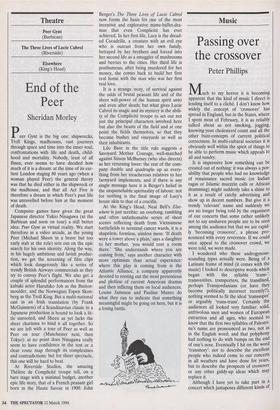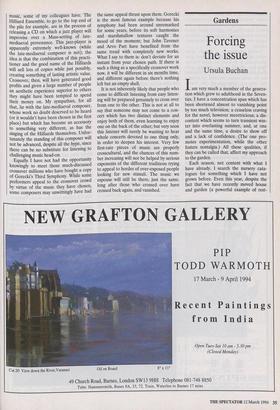Music
Passing over the crossover
Peter Phillips
Much to my horror it is becoming apparent that the kind of music I direct is lending itself to a cliché. I don't know how widely the concept of 'crossover' has spread in England, but in the States, where I spent most of February, it is as reliably talked about as not smoking, jogging, knowing your cholesterol count and all the other buzz-concepts of current political correctness. In multi-cultural societies it is obviously well within the spirit of things to be able to perform music which appeals to all and sundry.
It is impressive how something can be created out of nothing: it was always a pos- sibility that people who had no knowledge of renaissance sacred music (or Indian ragas or Islamic muezzin calls or African drumming) might suddenly take a shine to it as a result of catchy advertising and show up in decent numbers. But give it a trendy 'relevant' name and suddenly we are no longer being told by the organisers of our concerts that some rather unlikely not to say unshaven people are to be seen among the audience but that we are rapid- ly 'becoming crossover', a phrase pro- nounced with every reverence. If we could once appeal to the crossover crowd, we were told, we were made.
I wondered who these androgynous- sounding types actually were. Being of a Latinate frame of mind (it comes with the music) I looked to descriptive words which began with the syllable `trans-': transvestites, transporters, the transfixed, perhaps Transjordanians (or have they become politically incorrect recently?), nothing seemed to fit the ideal `transsuper' or arguably 'trans-trans'. Certainly the audiences all looked very familiar: solid, unfrivolous men and women of European extraction and all ages, who seemed to know that the first two syllables of Palestri- na's name are pronounced as two, not as in the English word; and that polyphony had nothing to do with bumps on the end of one's nose. Eventually I hit on the word `transitory': not to describe the excellent people who indeed come to our concerts in all weathers and have done for years, but to describe the prospects of crossover or any other giddy-up ideas which may replace it. Although I have yet to take part in a concert which juxtaposes different kinds of music, some of my colleagues have. The Hilliard Ensemble, to go to the top end of the pile for example, are in the process of releasing a CD on which a jazz player will improvise over a Mass-setting of late- mediaeval provenance. This jazz-player is apparently extremely well-known (while the late-mediaeval composer is not); the idea is that the combination of this practi- tioner and the good name of the Hilliards will sell lots of copies while just possibly, creating something of lasting artistic value. Crossover, then, will have generated good profits and given a large number of people an aesthetic experience superior to others they might have been tempted to spend their money on. My sympathies, for all that, lie with the late-mediaeval composer, whose work no doubt deserved to be heard (or it wouldn't have been chosen in the first place) but which has become an accessory to something very different, as has the singing of the Hilliards themselves. Unfor- tunately the standing of this composer will not be advanced, despite all the hype, since there can be no substitute for listening to challenging music head-on. Equally I have not had the opportunity knowingly to meet those much-discussed crossover millions who have bought a copy of Gorecki's Third Symphony. While some performers appeal to the crossover crowd by virtue of the music they have chosen, some composers may unwittingly have had the same appeal thrust upon them. Gorecki is the most famous example because his symphony had been around unremarked for some years, before its soft harmonies and marshmallow textures caught the mood of the moment; but John Tavener and Arvo Part have benefited from the same trend with completely new works. What I say to them is: don't deviate for an instant from your chosen path. If there is such a thing as a specifically crossover work now, it will be different in six months time, and different again before there's nothing left but an empty shell.
It is not inherently likely that people who come to difficult listening from easy listen- ing will be prepared genuinely to cross over from one to the other. This is not at all to say that someone may not come to a con- cert which has two distinct elements and enjoy both of them, even learning to enjoy one on the back of the other; but very soon this listener will surely be wanting to hear whole concerts devoted to one thing only, in order to deepen his interest. Very few first-rate pieces of music are properly crosscultural, and the chances of this num- ber increasing will not be helped by serious exponents of the different traditions trying to appeal to hordes of over-exposed people looking for new stimuli. The music we espouse will still be there, just the same, long after those who crossed over have crossed back again, and vanished.



















































 Previous page
Previous page